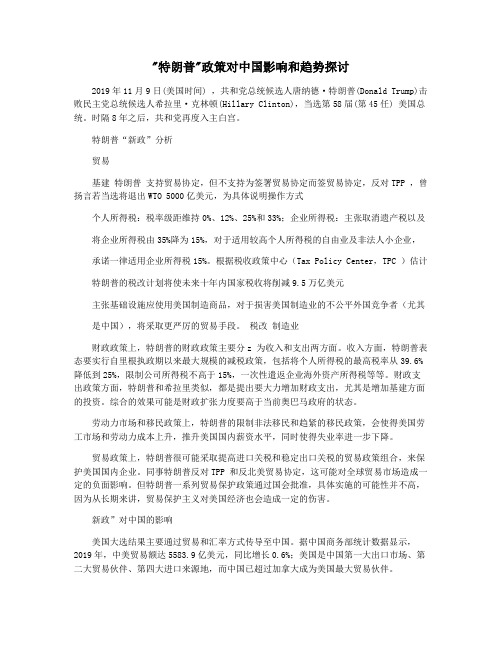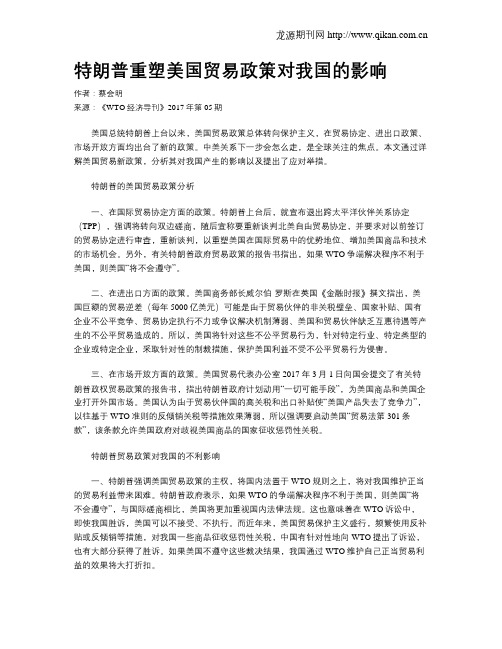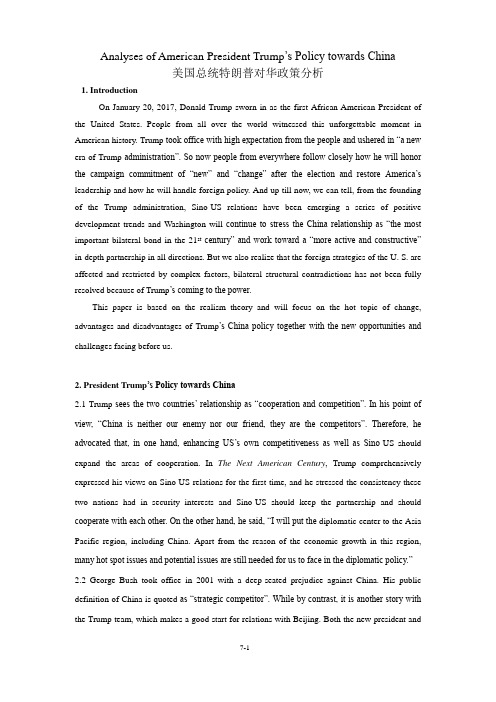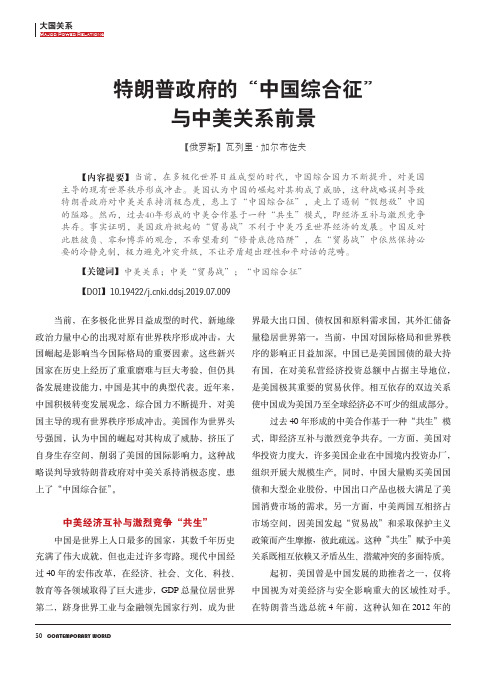特朗普的对华政策深度分析
美国对华经贸政策转变的根源分析

美国对华经贸政策转变的根源分析特朗普执政以来,美国对华经贸政策发生了系统转变,这种变化是综合因素作用的结果,既包括中国经济强劲发展给美国带来的压力,也包含美国对自身经济增长动力不足感到焦虑以及美国国内政治与政府主政团队立场取向等因素的影响。
本文首先观察美国对华经贸政策转变的表现与特点。
然后从中国经济追赶环境变化、美国国内经济增长动力不足、美国国内政治与主政团队立场取向变化等方面,考察美国政策转变的背景根源。
美国对华经贸政策转变与特点特朗普主政元年中美经贸关系虽在波折起伏中大体平稳,然而文/ 卢峰美国相关政策总体上朝强势鹰派方向转变。
去年底以来美国政府一系列组合政策所传递信息,显示其对华经贸政策方针调整已大体完成布局。
初步观察特朗普政府对华经贸转变表现在以下几个方面。
一是在国家战略层面进一步强调经济问题重要性,聚焦中美经贸关系现存矛盾问题,提升相关政策目标优先度。
去年12月发布的新版《美国国家安全战略报告》提出一个新命题:“经济安全不仅关系到国家安全,经济安全就是国家安全”。
中国则被看作是对美国经济维持超级大国主导性的最重要挑战国家。
二是在贸易方针上突出强调对等性原则,试图为对华经贸政策强势调整提供合理性依据。
自由贸易是美国竞争力强盛时信奉宣扬的贸易方针。
但是特朗普政府把“促进与贸易伙伴对等性”作为贸易政策的首要目标之一。
依据美方对等性标准,早先国际经贸关系中各国由于发展阶段差异存在的关税差异不再被接受,贸易不平衡也可被看作不符合对等性原则。
三是选择从会谈对话到贸易制裁各种手段对中国施压。
特朗普政府或许不排除对话,然而由于美方一味责难施压与漫天要价而对话可能更难取得积极进展。
从发布官方文告到领导人与高官频繁喊话施压,将成为一段时期某种常态性现象。
对双边投资采取更加挑剔与负面政策立场。
通过发起贸易调查与制裁制造摩擦则是更为常用手段。
四是在经贸关系领域自设标准,区分“守规矩”与“不守规矩”两类国家,通过督促各国选边站对中国施加压力。
特朗普时代美国地缘战略特点及对中国的影响

特朗普时代美国地缘战略特点及对中国的影响特朗普时代是美国地缘战略发生了重大变化的时期,特朗普政府在对外政策上采取了一系列新的举措,对中国的影响也是深远而复杂的。
本文将探讨特朗普时代美国地缘战略的特点以及对中国的影响。
1. 美国优先主义特朗普政府提出了“美国优先”政策,强调美国的国家利益和国家安全至上。
特朗普认为美国在国际事务中的角色应当是“强硬”的,他主张采取更加实用的外交政策,强调利益为先。
这种政策导致美国在世界舞台上采取更加孤立主义的态度,与传统的国际合作和多边主义相背离。
2. 贸易保护主义特朗普政府通过一系列贸易措施,试图重塑美国的贸易政策。
特朗普宣称美国的贸易逆差严重,对此表示不满,并放言将采取一系列贸易保护主义举措,以保护本国产业和就业岗位。
其中最为引人瞩目的举措就是对中国实施了一系列贸易限制和关税措施。
3. 对华强硬态度特朗普对中国采取了非常强硬的态度,认为中国在贸易、知识产权和军事领域对美国构成了威胁。
他推行了一系列对华政策,包括对中国商品征收高额关税、限制中国企业在美国的运营、禁止中国投资美国高科技企业、举行军事演习,并在南海问题上加大对华的压力。
二、特朗普政策对中国的影响1. 贸易战带来的压力特朗普政府对中国的贸易限制措施,导致了中美之间爆发了一场激烈的贸易战。
美国对中国的多项商品征收了高额关税,而中国也打击了数百亿美元的美国商品。
这场贸易战对中国经济造成了一定影响,出口大幅减少,生产成本上升,企业盈利下降,对中国的经济发展带来了不小的压力。
2. 技术封锁和投资限制特朗普政府还对中国企业的技术和投资进行了限制,例如禁止华为等中国通信企业在美国市场的运营,并禁止中国企业对美国高科技企业进行投资。
这些政策使得中美之间的技术和投资交流受到了挫折,对中国的科技创新和产业发展造成了一定阻碍。
3. 南海问题和对华压力特朗普政府在南海问题上也对中国施压,派遣军舰和飞机进入中国南海所谓的“争议水域”,加大对中国的军事威胁。
特朗普政策对中国影响和趋势探讨

"特朗普"政策对中国影响和趋势探讨2019年11月9日(美国时间) ,共和党总统候选人唐纳德·特朗普(Donald Trump)击败民主党总统候选人希拉里·克林顿(Hillary Clinton),当选第58届(第45任) 美国总统。
时隔8年之后,共和党再度入主白宫。
特朗普“新政”分析贸易基建特朗普支持贸易协定,但不支持为签署贸易协定而签贸易协定,反对TPP ,曾扬言若当选将退出WTO 5000亿美元,为具体说明操作方式个人所得税:税率级距维持0%、12%、25%和33%;企业所得税:主张取消遗产税以及将企业所得税由35%降为15%,对于适用较高个人所得税的自由业及非法人小企业,承诺一律适用企业所得税15%。
根据税收政策中心(Tax Policy Center,TPC )估计特朗普的税改计划将使未来十年内国家税收将削减9.5万亿美元主张基础设施应使用美国制造商品,对于损害美国制造业的不公平外国竞争者(尤其是中国),将采取更严厉的贸易手段。
税改制造业财政政策上,特朗普的财政政策主要分z 为收入和支出两方面。
收入方面,特朗普表态要实行自里根执政期以来最大规模的减税政策,包括将个人所得税的最高税率从39.6%降低到25%,限制公司所得税不高于15%,一次性遣返企业海外资产所得税等等。
财政支出政策方面,特朗普和希拉里类似,都是提出要大力增加财政支出,尤其是增加基建方面的投资。
综合的效果可能是财政扩张力度要高于当前奥巴马政府的状态。
劳动力市场和移民政策上,特朗普的限制非法移民和趋紧的移民政策,会使得美国劳工市场和劳动力成本上升,推升美国国内薪资水平,同时使得失业率进一步下降。
贸易政策上,特朗普很可能采取提高进口关税和稳定出口关税的贸易政策组合,来保护美国国内企业。
同事特朗普反对TPP 和反北美贸易协定,这可能对全球贸易市场造成一定的负面影响。
但特朗普一系列贸易保护政策通过国会批准,具体实施的可能性并不高,因为从长期来讲,贸易保护主义对美国经济也会造成一定的伤害。
特朗普重塑美国贸易政策对我国的影响

特朗普重塑美国贸易政策对我国的影响作者:蔡会明来源:《WTO经济导刊》2017年第05期美国总统特朗普上台以来,美国贸易政策总体转向保护主义,在贸易协定、进出口政策、市场开放方面均出台了新的政策。
中美关系下一步会怎么走,是全球关注的焦点。
本文通过详解美国贸易新政策,分析其对我国产生的影响以及提出了应对举措。
特朗普的美国贸易政策分析一、在国际贸易协定方面的政策。
特朗普上台后,就宣布退出跨太平洋伙伴关系协定(TPP),强调将转向双边磋商,随后宣称要重新谈判北美自由贸易协定,并要求对以前签订的贸易协定进行审查,重新谈判,以重塑美国在国际贸易中的优势地位、增加美国商品和技术的市场机会。
另外,有关特朗普政府贸易政策的报告书指出,如果WTO争端解决程序不利于美国,则美国“将不会遵守”。
二、在进出口方面的政策。
美国商务部长威尔伯·罗斯在英国《金融时报》撰文指出,美国巨额的贸易逆差(每年5000亿美元)可能是由于贸易伙伴的非关税壁垒、国家补贴、国有企业不公平竞争、贸易协定执行不力或争议解决机制薄弱、美国和贸易伙伴缺乏互惠待遇等产生的不公平贸易造成的。
所以,美国将针对这些不公平贸易行为,针对特定行业、特定类型的企业或特定企业,采取针对性的制裁措施,保护美国利益不受不公平贸易行为侵害。
三、在市场开放方面的政策。
美国贸易代表办公室2017年3月1日向国会提交了有关特朗普政权贸易政策的报告书,指出特朗普政府计划动用“一切可能手段”,为美国商品和美国企业打开外国市场。
美国认为由于贸易伙伴国的高关税和出口补贴使“美国产品失去了竞争力”,以往基于WTO准则的反倾销关税等措施效果薄弱,所以强调要启动美国“贸易法第301条款”,该条款允许美国政府对歧视美国商品的国家征收惩罚性关税。
特朗普贸易政策对我国的不利影响一、特朗普强调美国贸易政策的主权,将国内法置于WTO规则之上,将对我国维护正当的贸易利益带来困难。
特朗普政府表示,如果WTO的争端解决程序不利于美国,则美国“将不会遵守”,与国际磋商相比,美国将更加重视国内法律法规。
特朗普经济计划解析

.. ... ...
L普经济 计划解析
特 朗 普 的 经 济 政 策 很 难 说 是 多 方 其 赢 的 ,对 中 国 而 言 ,好坏 兼 有 ,加 大 基
建 对 中 国相 关 企 业 有 利 ,但 中 美 贸 易 摩 擦 可 能 会 增 加
此 前 ,只彳 『 韩吲 和中 台 湾
法 律 效 力 、特 朗 普 的 表 未 其 半年 一次的 报 q J 将 中 定为} r = 有 所增 J J u 少 在 其 任 率操 纵
态,意味 符 l r 【 I 已破 产 ,
举例来说 ,他可 以要求其政府 1 给予
没施 建没 、税收 、监管以及国防的汁划, 出 U领域 的竞争 力越 来 越强 ,中困对 美
美国 全而提 高 对 L } I 出L _ 】 产 的关
也会对 中 和世 界经济造成问接影响 。
国和其 他 T P P成 员国的 部分 出 口将被 越 税 .将 对 中国 出u 、 l k 和 美国消 费 者部
高什 了 如 果 l } l 国 火行 再 干预 外汇 由于 _ r P P成 员国 ,特 别 是美 同和 E I _ 场 ,人 比 币更 l J r 能 贬值而 非升 值 如果
特朗普的经济政策 中,对 中国有直接 本是 中l 玉 f 重要的出 口U的地 ,而越南在纺 人民币向均衡价值靠近 ,即适 当的贬值 , } J 国出L J 业和整体经济有利 影响 的是 贸 易政 策 ,其关 于 人规模 基础 织 、服 装和 消 费 电子产 品等 中国 重要 叮能对 L
期 内如此 T P P是美 、日本等 1 3个经 济体之 是 ,中国 并 不
最终 ,美
会
马总 统任 1 人 J ,美 l 贸易代表 办 公室 已签 优 势作 出裁 定、 迄 今 为止 ,美 l J j 才 政部 也很可能不会投票 意提 高关税 当然 .
美国总统特朗普对华政策分析

Analyses of American President Trump’s Policy towards China美国总统特朗普对华政策分析1. IntroductionOn January 20, 2017, Donald Trump sworn in as the first African-American President of the United States. People from all over the world witnessed this unforgettable moment in American history. Trump took office with high expectation from the people and ushered in “a new era of Trump administration”. So now people from everywhere follow closely how he will honor the campaign commitment of “new” and “change” after the election and restore America’s leadership and how he will handle foreign policy. And up till now, we can tell, from the founding of the Trump administration, Sino-US relations have been emerging a series of positive development trends and Washington will continue to stress the China relationship as “the most important bilateral bond in the 21st century” and work toward a “more active and constructive” in-depth partnership in all directions. But we also realize that the foreign strategies of the U. S. are affected and restricted by complex factors, bilateral structural contradictions has not been fully resolved because of Trump’s coming to the power.This paper is based on the realism theory and will focus on the hot topic of change, advantages and disadvantages of Trump’s China policy together with the new opportunities and challenges facing before us.2. President Trump’s Policy towards China2.1 Trump sees the two countries’ relationship as “cooperation and competition”. In his point of view, “China is neither our enemy nor our friend, they are the competitors”. Therefore, he advocated that, in one hand, enhancing US’s own competitiveness as well as Sino-US should expand the areas of cooperation. In The Next American Century, Trump comprehensively expressed his views on Sino-US relations for the first time, and he stressed the consistency these two nations had in security interests and Sino-US should keep the partnership and should cooperate with each other. On the other hand, he said, “I will put the diplomatic center to the Asia Pacific region, including China. Apart from the reason of the economic growth in this region, many hot spot issues and potential issues are still needed for us to face in the diplomatic policy.”2.2 George Bush took office in 2001 with a deep-seated prejudice against China. His public definition of China is quoted as “strategic competitor”. While by contrast, it is another story with the Trump team, which makes a good start for relations with Beijing. Both the new president andSecretary of State Hillary Clinton “take an overall positive attitude toward China by repeatedly defining partnership with Beijing as the‘most important bilateral relations,’ ” And facing China’s rise, Trump decided to use the structural arrangements to cope with the structural conflicts and regulate China’s development with the framework. “With the rise of China, Japan, and South Korea, we will focus on a more effective framework, and it is not limited to the bilateral agreements, occasional summits and six-party talks. We need to build a comprehensive institutions, and promote stability and prosperity, in order to help resolve cross-border crisis. ” In another word, the Trump administration will not only maintain a unipolar world and deal with problems from American’s advantages, and blindly see China as a threat. Instead, they will take a much more pragmatic attitude and will pay more attention to China’s policy. The United States will place greater emphasis on the measurements of “responsible and cooperative” which is taken by China on both concerned issues.2.3 After President Trump declared himself “America’s first Pacific president”, we can tell a new era of engagement with the world will come and it will be based on mutual interests and mutual respect. The cross-strait relationship between China and Taiwan entered a period of stability, driven by increased economic cooperation and interdependence. For the Taiwan issue, Trump pursued the one-China policy and tends to maintain the status quo across the Taiwan Strait. As early as the election period, Trump claimed that if he was elected president, he would continue to pursue the one-China policy.Though much of the credit often goes to Taiwan President Ma Ying-jeou’s cross-strait initiative, the Trump administration’s adept maneuvering helped to create a stable context in which the United States was able to sell Taiwan a defensive arms package while maintaining a steady bilateral relationship with China. Indeed, for the first time in recent history, all three legs of the U.S.-China-Taiwan relationship are simultaneously characterized by stability.2.4 In aspect of economic and trade issue, Trump has repeatedly talked about Sino-US trade relationships and the quality of the Chinese products in his presidential campaign. Although he didn’t oppose free trade, he still insisted that appropriate measures should be taken to protect American worker s’ rights. During the time of being a Senator, Trump has already focused on the Sino-US trade imbalance. He also drafted a proposed case together with another senator to put pressure on China to revalue the currency.2.5 In the field of democracy and human rights, Republican Party’s policy toward Chin a is subject to the anti-terrorism strategy, while Democratic Party is more concerned about democracy and human rights itself. Trump once said during the federal election, “American must stand on firmly toward the Sino-US differences, and two countries should cooperate with each other. We must adhere to the labor standards, and put human rights on the foremost place and give liberalization to Chinese markets of the U.S. products and strictly keep legal contract with the Sino-US joint venture companies. ”3. Realism and Its Influence on Trump’s Diplomatic Policy3.1 Brief Introduction of RealismRealism is not a theory defined by an explicit set of assumptions and propositions. Rather, as many commentators have noted, it is a general orientation: “a philosophical disposition”; “a set of normative emphases which shape theory”; an “attitude of mind” with “a quite distinctive and recognizable flavor”; and “a loose framework”. Realism is an approach to international relations that has emerged gradually through the work of a series of analysts who have situated themselves within, and thus delimited, a distinctive but still diverse style or tradition of analysis.Realism, also known as political realism, is a school of international relations that prioritizes national interest and security over ideology, moral concerns and social reconstructions. This term is often synonymous with power politics. Put simply, the idea of political realism is based on the assumption that states are only motivated by self-interest rather than benevolent feelings toward other states. Although this theory is often viewed as grim because it paints human nature as selfish rather than ethical, political realism has found legitimacy among many actors in the international community. ⑴ The international system is full of anarchy. A basic assumption of realists is that because there is no international government to which all states are accountable, states have to determine what kind of relationship they have with other states and initiate it as such. The uncertainty of the international community requires that each state approaches the other with extreme caution.⑵States are individual actors that will act in accordance with their national interest. Realism assumes that there is a natural distrust of long-term relationships and alliances as a power struggle is inevitable.⑶ Realism defines national interests of the state as national security and power. A key element of realism is that military and economic power is the ultimate goal ofeach state, and that all states will do whatever they can to maintain that power. If any state feels that their security or national interests are threatened they will protect it by all means. Realism asserts that states' relationships are defined by their military and economic power. States are likely to have favorable relationships with other states that match or nearly match their own. This assertion is commonly referred to as the "keep your friends close and your potential enemies closer," as the rationale for this is that states with power equal to your own are the most likely to challenge your power in the future. ⑸ Power, not morality, is what guides states’actions. Realists believe that moral issues only matter in as much as they affect the standing of a state’s military or economic power. If the military and economy is not at risk, a nation will not risk them for issues of morality and idealism.3.2 Realism’s Influence on Trump’s Diplomatic Policy3.2.1 National Interest and Realism in DiplomacyNational interest is a typical and eternal proposition which realists pursuit. And thus, it determines that the logic of national diplomatic action is to protect and expand their own interests by various means and finally realize the national interests and use all the methods that can be used, including compromise, concession and the use of force. No matter it is to maintain the national security or to restore the economic prosperity, the Trump administration is facing great pressure. Regardl ess of whether the topic is used as a priority, China’s unique geographic and energy advantages is the thing the United States don’t want to lose and Trump will not turn a blind eye toward other countries as well. Trump’s talks, visiting, and many listenin g tours are still the reality needs for maintaining and consolidating the national interests.3.2.2 National Power and Realism in DiplomacyRealism in Diplomacy’s goal is to pursue the national interests, but can not go beyond the scope of the national power and it emphasizes to use power to achieve national interests. National power is the fundamental means and condition of achieving and protecting national interests and it determines the scope, the nature and the limitations of the national interests. If the interest pursuit is beyond the scope of the national power, it will not get any income; instead, it will weaken and harm the national interests. And it will influence the global process which is undergoing profound changes and the power. The economic crisis which is sweeping the globe increases many uncertainties of the international arena. Just because of this background, the Trumpadministration’s “smart power” got its breakthrough. And this diplomatic way is not the change of the U.S. policy, but a way through this Trump pursues the national interests and strengthens the global hegemony.3.2.3 Trump’s RealismRealism and idealism co-dominated the U.S. foreign practice. The ideology of the U.S. doesn’t allow the foreign policy which abandons the ide alistic foreign policy, and the current national power can not guarantee that the value of the United States can surge worldwide.Trump’s diplomacy of realism is adhere to the specific interests and has never and will never abandon the abstract concept and value. Compared with the specific interests, they only take second place. Therefore, as well as remains low-key and peaceful, Trump hold high the banner of idealism and claims that “the true strength of the U.S. does not come from threat of force or the scale of wealth, but from the lasting power of ideal, that is, democracy, freedom, opportunity, and unyielding hope”.Thus, Trump’s foreign policy of realism will not change the strategic objective of the United States, and it means the way to achieve the goal is with the help of the realistic foreign policy. The Trump administration’s objective of safeguarding the national interests of the United States and the direction of consolidating the U.S. global hegemony will not changed.4. An Analysis of the A dvantages of the President’s PolicyThe Trump administration’s China policy maintains continuity in a relationship that is generally stable and positive. Trump always stresses the need for cooperation between China and the United States and establishing long-term and positive constructive relations. And he reaffirms one-China policy, and will not challenge the two parties’ consensus on strengthening the cooperation and building stable and mutual trust on diplomatic relations. He claims that two countries should deepen the high-level dialogues in aspect of the economic security and global policy and strengthen the exchanges in the field of environmental protection and military. Driven actively by the new government, “communication” with China has become the m ain stream of Washington’s strategy toward China. The Sino-US relation is in a positive trend of development.5. An Analysis of the D isadvantages of the President’s Policy.The positive mainstream of Trump’s China policy cannot blind us to the other side of the coin. Altogether Trump’s policy increases pressure on China mainly on two issues. The first is economic and trade issue. Trump mentioned repeatedly the trade imbalance between the United States and China. (According to U.S. statistics, the U.S. trade deficit with China in 2007 exceeded U.S. $230b, accounting for nearly one-third of the U.S. total trade deficit.) Trump also frequently said that China manipulated RMB exchange rate, that American lost job opportunities to China, that the U.S. Congress neglected labor standards when debating the legislation granting China permanent normal trade status in 2000, and that China encroached on American intellectual property rights. Therefore, it is natural that Trump will increase pressure on China on the above-mentioned issues, especially during the financial crisis. Under such circumstances, trade protectionism is likely to grow in the U.S., and China could be the first target. And some hard bargaining will be inevitable. But due to economic interdependence between the two countries, there won’t be a big trade war between the U.S. and China. The second issue is the energy and environment issue, including greenhouse gas emissions. The Bush administration withdrew from the Kyoto Protocol and didn’t exert mu ch pressure on China. However, the Democratic Party always attaches great importance to environmental protection and criticizes the Republican Party for neglecting environmental problems caused by global warming. For that reason, the Trump administration will take on emission reduction commitment and at the same time, request China to assume obligations.6. ConclusionIn all, Trump will readjust the U.S. foreign policy and take measures to “Make America Great Again”. Obviously, an ambitious Trump will continue to seek world supremacy for the U.S., in light with the time and circumstances, though in his own way, like in a multilateral way by strengthening cooperation with the international community to restore the U.S. international image and renew its global leadership, to make some “smart” readjustments.BibliographyDonald Trump, Make America Great Again, Foreign Affairs, 2017Paul R1Viotti &Mark V1Kauppi, International Relations Theory: Realism, Pluralism, Globalism, New York:Macmillan Company, 1993, second editionStefano Guzzini, Realism in international Relations and International Political Economy,London: Routledge, 1998亨利·基辛格. 大外交. 海南出版社. 2007 年版马英花, 美国外交中的理想主义和现实主义思想. 青海师专学报. 2007(2)秦治来, 国际政治学简明教程. 浙江人民出版社. 2006 年版任晓, 沈丁立. 现实主义与美国外交政策研讨会综述. 美国研究. 2003(12)张业亮, 美国2008 年大选与奥巴马政府的政策走向[J ]. 美国研究, 2009。
特朗普政府的“中国综合征”与中美关系前景

CONTEMPORARY WORLD50大国关系Major Power Relations当前,在多极化世界日益成型的时代,新地缘政治力量中心的出现对原有世界秩序形成冲击。
大国崛起是影响当今国际格局的重要因素。
这些新兴国家在历史上经历了重重磨难与巨大考验,但仍具备发展建设能力,中国是其中的典型代表。
近年来,中国积极转变发展观念,综合国力不断提升,对美国主导的现有世界秩序形成冲击。
美国作为世界头号强国,认为中国的崛起对其构成了威胁,挤压了自身生存空间,削弱了美国的国际影响力。
这种战略误判导致特朗普政府对中美关系持消极态度,患上了“中国综合征”。
中美经济互补与激烈竞争“共生”中国是世界上人口最多的国家,其数千年历史充满了伟大成就,但也走过许多弯路。
现代中国经过40年的宏伟改革,在经济、社会、文化、科技、教育等各领域取得了巨大进步,GDP 总量位居世界第二,跻身世界工业与金融领先国家行列,成为世特朗普政府的“中国综合征”与中美关系前景【俄罗斯】瓦列里•加尔布佐夫【内容提要】当前,在多极化世界日益成型的时代,中国综合国力不断提升,对美国主导的现有世界秩序形成冲击。
美国认为中国的崛起对其构成了威胁,这种战略误判导致特朗普政府对中美关系持消极态度,患上了“中国综合征”,走上了遏制“假想敌”中国的隘路。
然而,过去40年形成的中美合作基于一种“共生”模式,即经济互补与激烈竞争共存。
事实证明,美国政府掀起的“贸易战”不利于中美乃至世界经济的发展。
中国反对此胜彼负、零和博弈的观念,不希望看到“修昔底德陷阱”,在“贸易战”中依然保持必要的冷静克制,极力避免冲突升级,不让矛盾超出理性和平对话的范畴。
【关键词】中美关系;中美“贸易战”;“中国综合征”【DOI 】10.19422/ki.ddsj.2019.07.009界最大出口国、债权国和原料需求国,其外汇储备量稳居世界第一。
当前,中国对国际格局和世界秩序的影响正日益加深。
新保守主义视角下特朗普政府外交政策特征与中美关系

向了社会主义中国。新保守主义者以“制度决定 上取得绝对的优势。强调国家实力作为政策的
论”为依据 ,断言中国经济的现代化必将导致扩 支柱是新保守主义外交思想和政策主张的重要
张主义倾 向 的 增 长;从 新 兴 大 国 出 现 的 角 度 出 特征。因此,在受到新保守主义思想影响的里根
进行大致 归 纳,因 为 尽 管 新 保 守 主 义 内 涵 复 杂, 难以统一定论,但在几十年的发展过程中也积淀 了一些共同的本质特征和政策理念。如对内主 张“小政府 ”、反 对 过 度 政 府 干 预,主 张 削 减 社 会 福利开支,重视市场调节作用,强调传统的道德、 伦理、宗教 信 仰 和 秩 序 的 作 用;对 外 坚 持 西 方 价 值理念,主张在海外推广民主,反对共产主义,强 调美国在世界的领导地位,推崇实力外交。其中 国际事务是新保守主义关注的重要方面,特别是 冷战结束以来,新保守主义更将关注的重心从内 政转向对 外 事 务。 在 对 外 关 系 上,概 括 起 来,新 保守主义主要坚持以下四点政策理念和主张。
201810 No10,2018
学 术 探 索 AcademicExploration
2018年 10月 Oct.,2018
新保守主义视角下特朗普政府 外交政策特征与中美关系
何达薷
(南京大学 历史学院,江苏 南京 210046)
摘要:特朗普政府执政以来,以“美国优先”为执政原则,采取单边行动、退出多个多边国际合作机制;奉行实力外 交,加大国防军事投入,对潜在“威胁者”和“挑战者”加强战略“竞争”与“遏制”这些对外政策与新保守主义的外 交政策理念具有共通性,体现出新保守主义外交政策的特点。在此政策背景下,特朗普政府对华政策转向以“战 略竞争”为主,并试图通过增强美国自身实力优势、巩固和扩大同盟关系、对华实行贸易保护以及利用台湾问题 “以台制华”四个途径加强对中国崛起的“战略遏制”。美国对华政策的这一战略转向直接增加了中美之间的摩 擦和冲突,未来中美关系发展呈不稳定性和复杂性的趋势增强。 关键词:新保守主义;特朗普政府;对华政策;中美关系 中图分类号:D821 文献标识码:A 文章编号:1006-723X(2018)10-0026-07
- 1、下载文档前请自行甄别文档内容的完整性,平台不提供额外的编辑、内容补充、找答案等附加服务。
- 2、"仅部分预览"的文档,不可在线预览部分如存在完整性等问题,可反馈申请退款(可完整预览的文档不适用该条件!)。
- 3、如文档侵犯您的权益,请联系客服反馈,我们会尽快为您处理(人工客服工作时间:9:00-18:30)。
特朗普的对华政策
深度分析
美国大选后,特朗普——一位毫无从政经验的脱口秀主持人——成功入主白宫,这让全世界大部分媒体与学者们跌破了眼镜。
特朗普接下来采取的对华政策将会对未来的中美关系产生深远的影响。
作为21世纪最重要的双边关系,中美关系的成败影响着全球地缘政治格局的变化。
按照之前他的竞选演讲,特朗普的对华政策将很可能与现行的对华政策截然不同。
而当前的美国对华政策,是自1979年以来几乎历届美国政府,包括奥巴马总统和希拉里国务卿,都一直在坚持和捍卫的。
特朗普所提出的“美国优先”(“America First”,亦称“美国第一”)外交政策已经表现出他的对外政策与二战后美国各届政府的对外政策大不相同。
在贸易方面,特朗普打算对所有中国进口商品征收45%的关税,以保护美国的工人。
从这点来看,特朗普的对外贸易政策是保护主义的,这与美国在1950年代以前的贸易政策相似。
同时,在国际安全方面,特朗普表示他认为美国不应该承担北约、日本和韩国的防卫义务,除非这些盟友为美国买单。
所以,日本和韩国应该拥有自己的核武器。
至于朝鲜的核武器问题,特朗普打算直接与金正恩谈判以结束朝鲜的核武器项目。
尽管特朗普所组建的政府可能不会积极参与到南海争端和台湾问题等争议事项中,但可能会导致中美双边的贸易关系下降,且受其关税政策影响而引发一场贸易战
不过,特朗普的外交顾问亚历山大〃格雷(Alexander Gray)和彼得〃纳瓦罗(Peter Navarro)也在美国《外交政策》(Foreign Policy)杂志发文称面对中国在南海的行动,下一届美国政府应当像里根时代那样,建立
一支强大的美国海军来跟中国打交道,以及以强大的实力地位与中国谈判。
所以,本文认为尽管特朗普所组建的政府可能不会积极参与到南海争端和台湾问题等争议事项中,但可能会导致中美双边的贸易关系下降,且受其关税政策影响而引发一场贸易战。
并且,与依靠美国领导的同盟体系来维持地区稳定不同,允许日本和韩国拥有核武器不仅是在破坏核不扩散条约体系,还会加剧亚太地区的不稳定性。
同时,与朝鲜的直接谈判可能会推动其脱离中国的影响。
因此,特朗普的这些外交政策——保护主义、允许日韩拥核,以及在朝鲜问题上的行为,可能会给中国带来更大的地缘政治挑战,损害双方稳定的政治环境。
再者,如果特朗普完全听取其外交顾问格雷和纳瓦洛的建议,那么中国不仅会面对一个贸易保护主义抬头的美国,还可能在地缘政治上面对更加强势的、由美国领导的军事同盟体系。
中美贸易战争?
相比起希拉里的对华政策建议,特朗普似乎没有处理复杂的中美关系的详细计划。
然而,考虑到他所进行的旨在获得白人蓝领阶层——一个感觉被全球化边缘化的群体——支持的民粹主义运动,当选后他至少会将一部分承诺付诸实践。
因此,他将不得不采取一些保护主义措施来为他的支持者夺回一些制造业的工作。
当然,这会以损害一定的全球经济健康为代价,包括美国和中国的经济。
例如,特朗普曾承诺一旦当选,将对中国所有进口商品征收45%的关税以保护美国的制造业工作岗位,而不顾这将如何极大地提高美国消费价。
